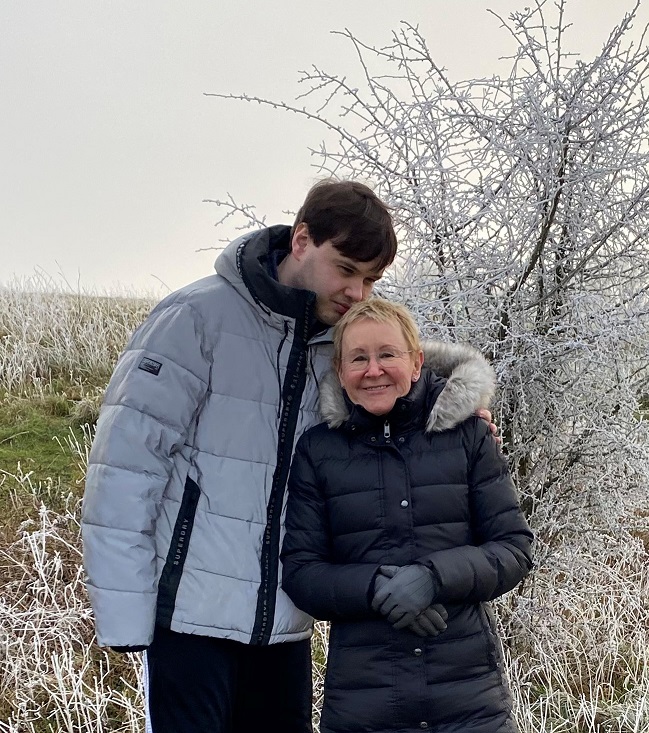Read Rose's story

Rose, in her 60s, carer for her son who has learning disabilities and autism. They live in Godalming.
I have a 30 year old son with learning disabilities and autism. He lives at home with myself and my husband. I am a lifelong carer.
My son requires full time supervision. He does not travel independently. He requires supervision with his personal care at home and when out in the community. He is also incontinent at night and sometimes during the day
I have to do a great deal to support him. Preparing all meals, stripping bed and making it each day plus his laundry. Finding ways to manage his obsessive behaviours and rituals which are constant. Organising entertainment and outings. Accompanying him on all travel. Ensuring his safety wherever he is, due to how vulnerable and biddable he is.
What do you find hardest about your caring role?
Getting tired as I have my own health problems including arthritis and heart problems. Not being able to have respite over the last year due to pandemic. Coping with his daily rituals.
Help from Action for Carers
Action for Carers are a much needed charity ensuring carers have a listening ear, and they act as advocate for those voices that remain unheard in broader society on issues around discrimination of disabled people and they educate businesses in the community on equality issues. They provide advice to carers too, through workshops and other meetings on matters like housing, benefits, employment, wills, etc and other ways in which the lives of carers can be improved.
What good things are there about being a carer?
Being a carer makes you feel more appreciative of all the positives that surround you each day. Knowing that other carers who are friends are going through exactly the same issues so are well placed to offer support and understanding to you.
There are many elderly carers in their 70s and 80s caring for a learning disabled adult child at home struggling with caring due to their own age related ill health and vulnerability, and having to consider what is going to happen to their learning disabled son or daughter after they die. This group of carers in society are often forgotten as agencies so often only talk about carers as either being someone caring for a child with a disability, or someone caring for an elderly parent with dementia and/or long term illness.
The following is an article Rose wrote for our newsletter, about the challenges facing older carers
Older carers under stress
Lack of Government funding and resources have meant more carers are under stress. Many older carers caring for an adult disabled child receive no help – emotional, practical or financial. The needs of autistic adults are seldom flagged up as a priority with many carers struggling at home unheard. Older carers caring for an adult disabled child, perhaps aged in their 40’s, 50’s or even 60’s will have been caring for this son or daughter for all of these years and not received any support from government or voluntary agencies. When these adult children were young, understanding of autism was patchy and many disabled children were not diagnosed until adulthood or they were often wrongly diagnosed.
Now in my sixties, thinking about my own autistic son’s future becomes more of a concern. I tire more easily and have arthritis, and the energy needed to be his full time carer for his physical, emotional and social needs has become more difficult. This is also the experience of many of my friends in the same situation.
Supported living nowadays has vastly improved and thankfully large homes caring for ten to fifteen disabled adults are now being replaced by smaller homes offering live in support to perhaps two or three adults. Thankfully the large institutional residential homes of previous decades are either closed or closing. The majority of caring staff today are kind and very professional. However, we still hear of horror stories about the appalling, inhumane ways in which some disabled people are treated by staff in residential homes purporting to offer good care.
Giant issues for parents
Housing, employment, socialising, financial and medical care, as well as day to day support are all giant issues facing us older parents still in a caring role. Working through the resources and services available is complicated, and nowadays there are fewer social workers being allocated to help and advise, and financial cut backs mean there is less money available to pay for activities, outings and taxis etc.. What is available in the way of support varies enormously from one local authority to another. Employment opportunities for autistic adults are patchy. Many businesses will only offer voluntary work, and the ones that do offer work, often have working environments that can create huge anxiety for the autistic person.
More support needed
As an older carer I think it would be good to see carers’ organisations offer more in the way of support in the form of informative meetings with guest speakers from local government and other agencies, as well as establishing support groups specifically for us older carers caring for an older disabled child at home.
In my experience I think voluntary agencies and the media are more vocalised about older carers who look after aged parents with dementia. Obviously, it is essential that there should be maximum support for these carers too, as well as those parents caring for a young disabled child. But our group of carers seem to have been somewhat marginalised as our needs are quite different to those caring for a young disabled person or a parent with dementia.
